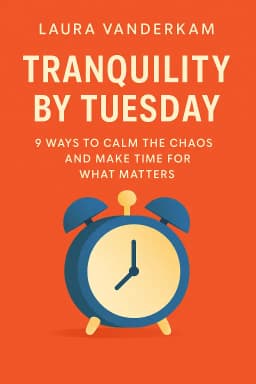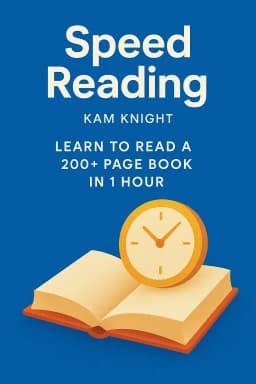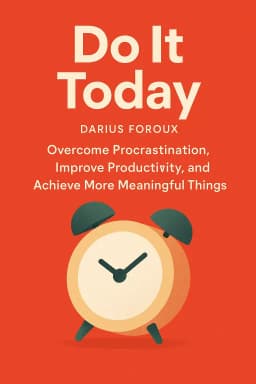
The Art of Strategic Laziness
Embrace What Matters, Ditch What Doesn’t, and Get Stuff Done
Golden Hook & Introduction
SECTION
Mark: Productivity culture has sold us a lie. It tells us to hustle harder, optimize everything, and never stop. But what if the secret to getting more done, and being happier, isn't doing more? What if it's about getting strategically lazy? Michelle: Strategically lazy? That sounds like a fantastic excuse to binge-watch a new series, Mark. What on earth does that even mean? Mark: It means being a genius about what matters and lazy about what doesn't. And it's the core idea behind a book that has been a huge, quiet phenomenon for people drowning in 'shoulds.' Today we're diving into The Lazy Genius Way by Kendra Adachi. Michelle: Ah, Kendra Adachi. I've heard her name. Her book has incredibly positive reader reception, right? People seem to connect with her on a really personal level. Mark: They really do. And she's the perfect person to write this. She calls herself a 'Pollyanna with a Clipboard,' which is just perfect. Her whole philosophy grew out of seeing smart, capable people—including herself—burn out from trying to do everything perfectly. She’s not a productivity guru from on high; she’s in the trenches with three kids, figuring it out. Michelle: A 'Pollyanna with a Clipboard.' I love that. It captures that blend of optimism and practicality. So, where do we start with becoming strategically lazy?
The Counter-Cultural Philosophy of Strategic Laziness
SECTION
Mark: Well, to understand the 'Lazy Genius' way, we first have to understand its opposite: the 'Anxious Genius' way. It’s that feeling that you have to be perfect at everything. Adachi tells this incredible story from early in her career that perfectly illustrates the problem. Michelle: Oh, I love a good disaster story. Let's hear it. Mark: She was young, newly married, and working at her old high school's church. She wanted to impress her coworkers, who had known her since she was a kid. So, she volunteers to make breakfast for a staff meeting of thirty people. Michelle: A classic 'prove myself' moment. I know it well. Mark: Exactly. But instead of bringing donuts, she decides to make stuffed French toast. She's never made it before, refuses to use a recipe, and goes all out. She buys expensive platters, fancy linens... the works. Michelle: Oh no. I can already see where this is going. What did she stuff it with? Please say something normal like strawberries and cream cheese. Mark: She made two kinds. One was cream cheese and raspberry jelly, which sounds okay. The other... was American cheese. Michelle: Wait. On Wonder bread? American cheese... French toast? That's not just a bad idea, that's a culinary crime. Mark: It gets worse. Instead of dipping the sandwiches in an egg custard and frying them, she just... bakes them. So what comes out of the oven is basically hot, soggy bread with melted plastic cheese inside. It was, by her own account, a complete and utter disaster. People were disappointed, she was humiliated, and she wanted to quit her job. Michelle: Wow. That is a truly spectacular failure. But it sounds like an extreme case of trying to be impressive. How does this 'lazy' alternative actually work day-to-day? I mean, the book also mentions her friend Jamie Golden’s story of moldy laundry and overflowing trash. Isn't being lazy just a path to chaos? Mark: That’s the critical distinction Adachi makes. This isn't about apathy or neglect. It's about intentionality. The core mantra of the whole book is: "Be a genius about the things that matter and lazy about the things that don’t... to you." The problem with the French toast wasn't the effort; it was that she was being a 'genius' about the wrong thing. She cared about impressing people, not about making a decent breakfast. Michelle: Okay, so the 'lazy' part is giving yourself permission to not care about the things that genuinely don't matter to your well-being or your core values. It's not about letting your house fall apart, but maybe about not caring if your napkins match the placemats. Mark: Precisely. It’s a rebellion against the idea that you have to care about everything equally. You get to choose your battles. You get to decide where your energy goes. And that choice is the foundation of everything else.
The Three Pillars of the Lazy Genius Operating System
SECTION
Michelle: I'm sold on the philosophy. 'Be a genius about what matters.' It feels liberating. But that sounds great in theory. How do you actually do it when life is a constant stream of decisions and tasks? Mark: This is where the philosophy becomes an operating system. Adachi offers thirteen principles, but I think three of them form the foundational pillars of how to live this way. They are: Decide Once, Start Small, and Ask the Magic Question. Michelle: An operating system for your brain. I like that. Let's break down the first one: 'Decide Once.' Mark: It's about eliminating decision fatigue for recurring, low-stakes choices. Think about how much mental energy you spend each day on trivial things. What should I wear? What's for dinner? Adachi gives the example of her 'Monday Uniform.' For years, she decided to wear the same outfit every single Monday. Michelle: Just... the same thing every week? Mark: Yep. A black shirt, jeans, and a specific pair of shoes. The decision was made. It required zero thought on a Monday morning, freeing up that brain space for more important things, like being patient with her kids. It’s like what high-powered executives do—they wear the same suit every day. They've decided once, so they can save their mental energy for billion-dollar decisions, not for choosing a tie. Michelle: So 'Decide Once' is like setting your life's unimportant tasks to 'autopilot.' I can see that for clothes, or maybe for kids' lunches. What's the second pillar? Mark: 'Start Small.' And this one is a direct challenge to our 'go big or go home' culture. Adachi tells this incredibly powerful story about her journey with yoga. For years, she wanted to make it a regular practice. She tried everything: 30-minute sessions four times a week, fancy apps, expensive equipment, hot yoga classes. And she failed every single time. Michelle: That sounds like every New Year's resolution I've ever made. The enthusiasm is there for about a week, and then it's gone. Mark: Exactly. Because the bar was too high. So, in her frustration, she decided to try something ridiculously small. Her goal became to do one single downward-dog pose every day. That's it. Maybe 15 seconds of effort. Michelle: Just one pose? That almost feels like it doesn't count. Mark: That's what she thought! It felt silly. But it was so easy, she couldn't not do it. And that small, consistent act did two things. First, it kept the idea of 'I am a person who does yoga' alive in her mind. Second, it created momentum. After a while, one down-dog felt good, so she added a few more poses, building into a sun salutation. Fourteen months later, she had a breakthrough. She realized her heels were flat on the ground and she could hold a plank. The rock had finally split, not from one big hit, but from hundreds of tiny, consistent taps. Michelle: Wow. That's a powerful reframe. The goal isn't the finish line; the goal is just to keep moving. Okay, so we have 'Decide Once' to reduce fatigue and 'Start Small' to build momentum. What's the third pillar? Mark: 'Ask the Magic Question.' This is my favorite because it turns you into a time traveler who helps your future self. The question is: "What can I do now to make life easier later?" Michelle: I like the sound of that. It feels proactive. But isn't there a risk of just creating more work for yourself now? Mark: It’s not about doing huge, elaborate prep. It's about small, high-leverage actions. The example she gives is the after-school snack platter. She knows that the 3 PM to 5 PM window with kids is pure chaos. They're hungry, tired, and cranky. So, at 1 PM, when things are calm, she asks the Magic Question. The answer? She takes five minutes to put some crackers, carrots, and pepperoni on a plate and leaves it on the table. Michelle: Oh, I see. So when the kids storm in, the first domino to fall is a positive one. Mark: Exactly! Instead of "I'm hungry!" and a meltdown, it's "Ooh, snacks!" They eat, they're happy, they're more likely to put their backpacks away, and she avoids turning into what she calls 'Hulk Mom.' That one tiny action—making the snack platter—completely changes the trajectory of the entire afternoon. It's a five-minute investment for two hours of peace. That's the magic.
The Engine of Self-Kindness
SECTION
Mark: These principles are powerful tools. Decide Once, Start Small, Ask the Magic Question. You could build a very efficient life with just those. But Adachi argues they're all useless without the final, most important principle. And it’s the one most productivity systems completely ignore. Michelle: Let me guess. It has something to do with kindness? Mark: You got it. The thirteenth and final principle is 'Be Kind to Yourself.' And this isn't a fluffy, feel-good platitude at the end. She argues it is the absolute foundation. Without self-compassion, all the systems in the world won't save you from burnout. Michelle: That feels profoundly true. You can have the most organized calendar on the planet, but if you're constantly beating yourself up for not being perfect, you're still going to be exhausted. Mark: She tells this incredibly vulnerable story. One night, after a brutal bedtime battle with her three-year-old, she comes downstairs completely drained and defeated. She tearfully tells her husband, "I feel like a terrible mom." He just sits there silently. And she gets furious with him for not immediately reassuring her. Michelle: Oh, I know that feeling. You want comfort, but you're also ready to fight anyone who gives it to you because you don't believe you deserve it. Mark: That's exactly what happened. Later, she apologizes and asks him why he was silent. And he says, "Because I knew whatever I said, you would have argued with me. You weren't ready to believe you're a good mom, so you wouldn't have let me tell you." She realized he was right. She couldn't receive kindness from him because she wasn't offering any to herself. Michelle: Wow. That's a heavy, honest moment. It really shows that self-criticism is like a shield that blocks out love and support. Mark: It is. And it connects to another key principle: 'Schedule Rest.' We see rest as a reward for being productive. Adachi reframes it as the fuel for being productive. It's not something you earn; it's something you require to function. And 'rest' doesn't just mean a nap or a vacation. It means doing things that make you feel like yourself. Michelle: That's it, isn't it? We're so used to self-criticism as a motivator. We think if we're hard on ourselves, we'll achieve more. The idea that self-kindness is actually more effective feels... revolutionary. It reframes the whole book from a 'how-to' guide to a 'how-to-be' guide. Mark: It's a total paradigm shift. You stop treating yourself like a project to be fixed and start treating yourself like a friend to be supported.
Synthesis & Takeaways
SECTION
Mark: When you put it all together, you see the genius of her system. It's not just a collection of tips. You have this powerful, counter-cultural philosophy against perfectionism. You have a simple, practical operating system to put that philosophy into action. And it's all powered by the engine of self-compassion. It’s a complete ecosystem for living well, not just for getting things done. Michelle: It really is. It’s permission to be human. Permission to have limits, to prioritize joy, and to let go of the things that drain you without feeling guilty. It’s not about achieving an empty inbox; it’s about creating a life that actually feels like your own. Mark: And in a world that constantly screams for more, the most radical thing you can do is decide what is 'enough.' Michelle: It makes you wonder, what is one small, recurring decision in your life that you could 'decide once' on this week to free up just a little bit of brain space? Mark: That's a great question for our listeners. We’d love to hear your ideas. Let us know what you come up with on our social channels. What's one thing you can make easier for your future self? Michelle: This is Aibrary, signing off.









